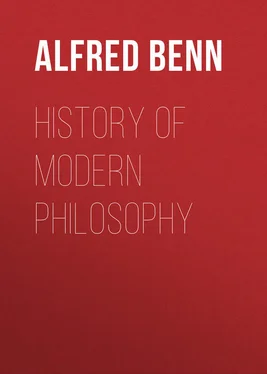Alfred Benn - History of Modern Philosophy
Здесь есть возможность читать онлайн «Alfred Benn - History of Modern Philosophy» — ознакомительный отрывок электронной книги совершенно бесплатно, а после прочтения отрывка купить полную версию. В некоторых случаях можно слушать аудио, скачать через торрент в формате fb2 и присутствует краткое содержание. Жанр: foreign_antique, foreign_prose, Историческая проза, на английском языке. Описание произведения, (предисловие) а так же отзывы посетителей доступны на портале библиотеки ЛибКат.
- Название:History of Modern Philosophy
- Автор:
- Жанр:
- Год:неизвестен
- ISBN:нет данных
- Рейтинг книги:5 / 5. Голосов: 1
-
Избранное:Добавить в избранное
- Отзывы:
-
Ваша оценка:
- 100
- 1
- 2
- 3
- 4
- 5
History of Modern Philosophy: краткое содержание, описание и аннотация
Предлагаем к чтению аннотацию, описание, краткое содержание или предисловие (зависит от того, что написал сам автор книги «History of Modern Philosophy»). Если вы не нашли необходимую информацию о книге — напишите в комментариях, мы постараемся отыскать её.
History of Modern Philosophy — читать онлайн ознакомительный отрывок
Ниже представлен текст книги, разбитый по страницам. Система сохранения места последней прочитанной страницы, позволяет с удобством читать онлайн бесплатно книгу «History of Modern Philosophy», без необходимости каждый раз заново искать на чём Вы остановились. Поставьте закладку, и сможете в любой момент перейти на страницу, на которой закончили чтение.
Интервал:
Закладка:
Democracy, however, was not the sole or the worst enemy dreaded by the author of Leviathan as a competitor with his "mortal god." In the frontispiece of that work the deified monarch who holds the sword erect with his right hand grasps the crozier with his left, thus typifying the union of the spiritual and temporal powers in the same person. The publicists of the Italian Renaissance, with their classical ideals, had, indeed, been as anti-papal as the Protestants; and the political disorders fomented by the agents of the Catholic reaction during the last hundred years had given Hobbes an additional reason for perpetuating their point of view. Meanwhile another menace to public order had presented itself from an opposite quarter. Calvinism had created a new spiritual power based on the free individual interpretation of Scripture, in close alliance with the alleged rights of conscience and with the spirit of republican liberty. Each creed in turn had attacked the Stuart monarchy, and the second had just effected its overthrow. Therefore, to save the State it was necessary that religious creeds, no less than codes of conduct, should be dictated by the secular authority, enslaving men's minds as well as their bodies.
By the dialectic irony of the speculative movement, this attempt to fetter opinion was turned into an instrument for its more complete emancipation. In order to discredit the pretensions of the religious zealots, Hobbes made a series of attacks on the foundations of their faith, mostly by way of suggestion and innuendo – no more being possible under the conditions then obtaining – but with such effect that, according to Macaulay, "for many years the Leviathan was the gospel of cold-blooded and hard-headed unbelievers." That one who made religious belief a matter to be fixed by legislation could be in any sense a Christian seems most unlikely. He professed, with what sincerity we know not, to regard the existence of God as something only a fool could deny. But his philosophy from beginning to end forms a rigorously-thought-out system of materialism which any atheist, if otherwise it satisfied him, might without inconsistency accept.
On the meeting of the Long Parliament, Hobbes again left England for the Continent, where he remained for eleven years. But his principles were no more to the taste of the exiled royalists than of their opponents. He therefore returned once more to England, made his submission to the Parliament, and spent the rest of his days, practically unmolested by either party, under the Commonwealth and the Restoration until his death in 1679 at the age of ninety-one.
It may be said of Hobbes, as of Bacon, that the intellect at work is so amazing and the mass of literary performance so imposing that the illusions of historians about the value of their contributions to the progress of thought are excusable. Nevertheless, it cannot be too distinctly stated that the current or academic estimate of these great men as having effected a revolution in physical and moral science is wrong. They stand as much apart from the true line of evolution as do the gigantic saurians of a remote geological period whose remains excite our wonder in museums of natural history. Their systems proved as futile as the monarchies of Philip II. and of Louis XIV. Bacon's dreams are no more related to the coming victories of science than Raleigh's El Dorado was to the future colonial empire of Britain. Hobbes had better fortune than Strafford, in so far as he kept his head on his shoulders; but the logic of his absolutism shrivelled up under the sun of English liberty like the great Minister's policy of Thorough.
The theory of a Social Contract is a speculative idea of the highest practical importance. But the idea of contract as the foundation of morals goes back to Epicurus, and it is assumed in a more developed form by Hooker's Ecclesiastical Polity . Its potency as a revolutionary instrument comes from the reinterpretations of Locke and Rousseau, which run directly counter to the assumptions of the Leviathan .
Hobbes shares with Bacon the belief that all knowledge comes from experience, besides making it clearer than his predecessor that experience of the world comes through external sense alone. Here also there can be no claim to originality, for more than one school of Greek philosophy had said the same. As an element of subsequent thought, more importance belongs to the idea of Power, which was to receive its full development from Spinoza; but only in association with other ideas derived from the philosopher whom we have next to examine, the founder of modern metaphysics, Descartes.
Chapter II.
THE METAPHYSICIANS
René Descartes (1596-1650) was a Frenchman, born in Touraine, and belonging by family to the inferior nobility. Educated at the Jesuit college of La Flèche, he early acquired a distaste for the scholastic philosophy, or at least for its details; the theology of scholasticism, as we shall see, left a deep impression on him through life. On leaving college he took up mathematics, varied by a short plunge into the dissipations of Paris. Some years of military service as a volunteer with the Catholic armies at the beginning of the Thirty Years' War enabled him to travel and see the world. Returning to Paris, he resumed his studies, but found them seriously interrupted by the tactless bores who, as we know from Molière's amusing comedy Les Fâcheux, long continued to infest French society. To escape their assiduities Descartes, who prized solitude before all things, fled the country. The inheritance of an independent income enabled the philosopher to live where he liked; and Holland became, with a few interruptions, his chosen residence for the next twenty years (1629-49). Even here frequent changes of residence and occasional concealment of his address were necessary in order to elude the visits of importunate admirers. With all his unsociability there seems to have been something singularly magnetic about the personality of Descartes; yet he only fell in with one congenial spirit, the Princess Elizabeth, daughter of the unfortunate Winter King and granddaughter of our James I. Possessing to the fullest extent the intellectual brilliancy and the incomparable charm of the Stuart family, this great lady impressed the lonely thinker as the only person who ever understood his philosophy.
Another royal friendship brought his career to an untimely end. Queen Christina of Sweden, the gifted and restless daughter of Gustavus Adolphus, heard of Descartes, and invited him to her Court. On his arrival she sent for the pilot who had brought the illustrious stranger to Stockholm and questioned him about his passenger. "Madame," he replied, "it is not a man whom I conducted to your Majesty, but a demi-god. He taught me more in three weeks of the science of seamanship and of winds and navigation than I had learned in the sixty years I had been at sea" (Miss E. S. Haldane's Life of René Descartes ). The Queen fully came up to the expectations of her visitor, in whose eyes she had no fault but an unfortunate tendency to waste her time on learning Greek. Besides her other merits, she possessed "a sweetness and goodness which made men devoted to her service." It soon appeared that, as with others of the same rank, this was only the veneer of a heartless selfishness. Christina, who was an early riser, required his attendance in her library to give her lessons in philosophy at five o'clock in the morning. Descartes was by habit a very late riser. Besides, he had not even a lodging in the royal palace, but was staying at the French Embassy, and in going there "had to pass over a long bridge which was always bitterly cold." The cold killed him. He had arrived at Stockholm in October, and meant to leave in January; but remained at the urgent request of the Queen, who, however, made no change in the hour of their interviews, although that winter was one of the severest on record. At the beginning of February, 1650, he fell ill and died of inflammation of the lungs on the 11th, in the fifty-fourth year of his age.
Читать дальшеИнтервал:
Закладка:
Похожие книги на «History of Modern Philosophy»
Представляем Вашему вниманию похожие книги на «History of Modern Philosophy» списком для выбора. Мы отобрали схожую по названию и смыслу литературу в надежде предоставить читателям больше вариантов отыскать новые, интересные, ещё непрочитанные произведения.
Обсуждение, отзывы о книге «History of Modern Philosophy» и просто собственные мнения читателей. Оставьте ваши комментарии, напишите, что Вы думаете о произведении, его смысле или главных героях. Укажите что конкретно понравилось, а что нет, и почему Вы так считаете.












